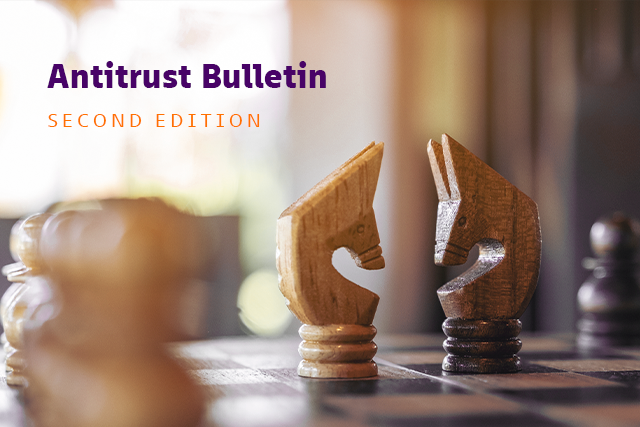

2023 in numbers: a retrospective of CADE’s enforcement of anticompetitive conduct
Despite no dramatic shift in the number of cases Brazil's antitrust authority ruled on, the fines it handed down were the lowest in five years
In 2023, CADE’s Tribunal ruled on 17 administrative proceedings (formal probes to investigate anticompetitive conduct). Even with trial sessions being suspended in the second half of the year due to a lack of quorum (four of the seven commissioners were coming to the end of their mandate), CADE still managed to rule on a higher number of proceedings than in 2022 (13).
Given the considerable backlog of cartel cases at CADE, the majority of rulings in 2023 focused on these cases – consistent with the trend observed in previous years. Along with the 13 cartel cases that the Tribunal ruled on, there were three unilateral conduct cases and one uniform conduct case.
The rulings resulted in the Tribunal handing down a total of BRL 114 million (USD 24 million) in fines. Partial convictions occurred in eight cases (47%), with dismissals in seven cases (41%), a full conviction in one case (6%), and a suspension in another (6%).
The total value of the fines CADE handed down is of note, representing only 6.7% of the collected revenue compared to 2022, even with the higher number of rulings. Furthermore, the total value of the fines was the lowest sum in the last five years and broke an upward trend that had been in place since 2020.
| 2019 | 2020 | 2021 | 2022 | 2023 | |
| Total rulings | 28 | 17 | 25 | 13 | 17 |
| Fines (Total value) | BRL 792 million (USD 164 million) | BRL 138 million (USD 29 million) | BRL 1.3 billion (USD 269 million) |
BRL 1.7 billion (USD 351 million) | BRL 114 million (USD 24 million) |
| Cartels | 15 | 14 | 22 | 11 | 13 |
| Unilateral Conduct | 10 | 3 | 2 | 2 | 3 |
| Uniform Conduct | 3 | 0 | 1 | 0 | 1 |
Source: Cade Yearbook (2023).
Meanwhile, CADE executed only two leniency agreements in 2023, as was the case in 2022.
As for agreements stemming from the authority’s anticompetitive conduct investigations, CADE’s Tribunal approved 13 settlement agreements (TCCs) with companies and individuals. This number was largely similar to the average in previous years, except for 2022 (an atypical year in which 37 TCCs were approved). Financial contributions collected from TCCs totaled over BRL 92 million (USD 19 million) in 2023:
| 2019 | 2020 | 2021 | 2022 | 2023 | |
| Settlement Agreements | 19 | 17 | 9 | 37 | 13 |
| Financial contributions | BRL 167 million (USD 35 million) |
BRL 140 million (USD 29 million) |
BRL 58 million (USD 12 million) |
BRL 724 million (USD 150 million) |
BRL 92 million (USD 19 million) |
Source: Cade Yearbook (2023).
Key cases
At the beginning of 2024, CADE convicted 18 companies and 20 individuals for participating in a hub-and-spoke cartel for public tenders and contracts linked to acquiring projectors and digital whiteboards. In this case, CADE’s Tribunal noted that competitively sensitive information was shared to fix selling prices. The authority has also been paying increased attention to the oil and gas sector, convicting a cartel that rigged a bid to supply fuel in the state of Paraná. This conviction resulted in fines and non-financial penalties, including banning the cartel members from participating in public tenders and prohibiting them from undertaking commercial activities. The Tribunal also convicted another cartel in the fuel resale market in the state of Santa Catarina, with fines totaling BRL 55 million (USD 11 million).
On the other hand, of the three unilateral conduct cases the Tribunal ruled on, only one resulted in a conviction. The case involved an investigation against the Regional Dentistry Council of Minas Gerais and the Brazilian Dentistry Council for using their position as regulatory entities to prevent regulated entities from employing discount cards for dental services – which CADE’s Tribunal deemed anticompetitive.
Regarding agreements stemming from CADE’s investigations, a TCC between CADE and the food delivery platform iFood is particularly noteworthy. It resulted in the company agreeing to limit the scope of its exclusivity clauses with restaurants registered on the platform in exchange for suspending the investigation.
2023 was also marked by CADE’s General Superintendence (GS) continuing to impose interim measures in anticompetitive conduct investigations, such as those imposed against state-owned financial services company Caixa Econômica Federal. The GS ordered the company to stop penalizing lottery establishments that conducted business with lottery intermediation platforms.
Guidelines on calculating cartel fines
On September 27, 2023, CADE published its latest guidelines on calculating cartel fines. Based on an assessment of the fines CADE set in cartel cases from January 2012 to December 2022, the document seeks to provide companies with more visibility regarding the steps CADE’s Tribunal generally takes when calculating cartel fines, along with an overview of CADE’s recent decisions.
The guidelines describe in detail the steps taken when calculating fines:
- The calculation basis and the base rate for the fine is established;
- The rate is adjusted in consideration of mitigating and aggravating factors, as well as the length of time the cartel was operating; and
- The fine is compared with legal standards provided for in the Brazilian Competition Law.
CADE’s cooperation agreement with the Office of the Comptroller General
Cade and the Brazilian Comptroller General’s Office (CGU) signed a technical cooperation agreement in November 2023 to ensure more integrated and efficient action in cartel investigations.
The cooperation agreement covers the information and database sharing between the two authorities as a means of improving the workflow in conduct-related investigations that fall under the jurisdiction of both Cade and the CGU. The agreement also stems from CADE’s focus on tackling bid-rigging cartels, which (as seen above) was the most recurring type of conduct in the cases CADE ruled on in 2023.
For further information on competition law matters in Brazil, please contact Mattos Filho’s Antitrust practice area.







